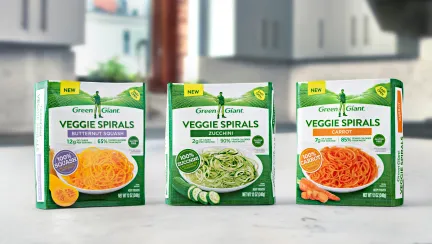B&G Foods exploring sale of Green Giant frozen, canned vegetable businesses

Dive Brief:
- B&G Foods is “evaluating a possible divestiture” of some or all of its brands in the frozen and canned vegetable space, the company said in a statement. The sale could come in one transaction or a series of deals.
- Casey Keller, B&G’s CEO, said that while Green Giant is a well-known brand in frozen and that vegetables in the category benefit from healthy and dietary trends, the frozen vegetables business “may not be the right fit” for the food manufacturer. He said B&G doesn’t plan to add more assets in frozen due to capital constraints and opportunities within its shelf-stable business.
- B&G has been divesting assets recently to focus its operations and reduce its long-term debt. The New Jersey-based company sold its Green Giant canned business to Seneca Foods last November and its snacks brand Back to Nature in 2022 to Barilla.
Dive Insight:
Once a serial acquirer whose brands include Crisco, Ortega and Cream of Wheat, B&G is considering divestitures representing 10% to 15% of the company’s consolidated net sales.
“We remain committed to driving low single digit growth and continuing to reduce leverage,” Keller said. “Further, we are accelerating efforts to reshape and clarify the portfolio for sharper focus and fit.”
Green Giant represents a strong business that doesn’t fit with B&G’s shelf-stable business responsible for the lion’s share of its sales. Frozen utilizes a different packing and shipping process from the rest of its food operations. With B&G not planning to further add to its frozen business, and facing capital constraints, it makes sense for the company to explore jettisoning the unit.
Keller also telegraphed why it’s looking to divest its remaining canned vegetable businesses when it sold its Green Giant canned line in 2023. At the time, he said canned vegetables are a mature category with high working capital needs. B&G would have to increase debt to finance seasonal inventory, which is packed and held for an entire year.
The decision to further adjust its portfolio came as B&G lowered its earnings and net sales for the year. It is projecting sales guidance between $1.96 billion to $1.99 billion from initial guidance of $1.98 billion to $2.02 billion.
During its first quarter, Keller said B&G observed consistent margins and moderating inflation. He said the decline in net sales was driven by foodservice trends and increased promotion spending. Volumes to retail customers were relatively flat.
B&G is currently divided into four segments, each of which posted a drop in sales during the quarter from the same period a year ago. Frozen and vegetables dipped 16.9%, spices and flavor solutions fell 5.4%, specialty declined 4.9% and meals slipped 1.6%.
Robert Moskow, an analyst at TD Cowen, expressed skepticism over B&G’s assertion that its at-home portfolio would benefit from consumers preparing more of their own meals. The food maker claimed the segment would offset weakness in foodservice and consumers trading down to private label.
“In our view, these assumptions sound overly optimistic given the likelihood that consumers will accelerate their value-seeking behavior in the grocery channel and the possibility of heightened competitive intensity,” Moskow said in a research note.
He added that he assigned a 35% discount to B&G compared to its large-cap peers due to its “highly levered” balance sheet, a “structurally disadvantaged portfolio” and the “significant portfolio reshaping ahead to right-size the business.” B&G’s stock fell 17% to $9.50 on Thursday. Moskow has an $8 price target on the stock.
Source: fooddive.com

